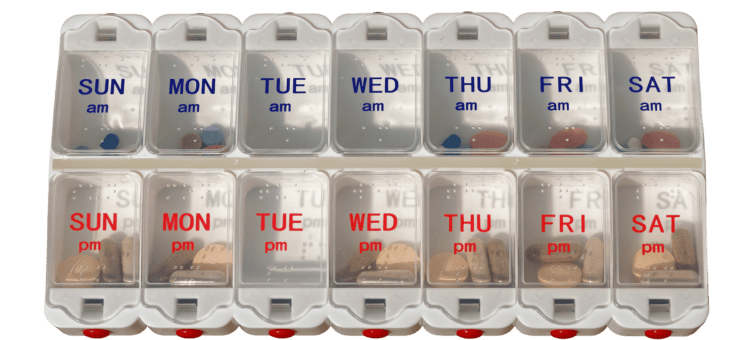The risk of contracting chronic diseases increases as we age, so it’s not surprising that two of three older Americans deal with multiple chronic conditions. As the body ages, the conditions begin to involve complex treatments, such as juggling a handful of various medications. These can be confusing to keep track of, so many seniors end up confusing a certain pill for a prescription drug, only to later find out that they’re vitamins. Unfortunately, such issues should not be taken lightly.
Here are five medication management tips to help empower seniors, caregivers, and family members about proper medication use and organization:
1 – Set enough reminders and keep up with a tracking system
With so many medications to remember, it can be tough for seniors and caregivers alike to remember when and what to take. A tracking system can help let you know when to take the correct medication at the right time.
One simple way of tracking is through a medication log using a pen and paper. To do this, create a simple chart that contains medication name and dose, scribbling the day and exact time next to it. As they take the dose, remind them to record it with a check.
Setting up reminders is also crucial and can be done through mobile alarms. Tech-savvy seniors might also find specific apps for taking medicine useful.
2 – Organize pills into dispensers with daily labels
Individuals taking multiple medications should have organized containers, preferably ones that enable you to organize by each day of the week. This allows seniors to consume the right pills every day, also preventing them from forgetting a dose.
3 – Determine if you need to take foods or liquids with certain medications
Medications usually require you to have a full stomach before eating, but this isn’t always the case. Seniors who take multiple medications should also be aware of what food or drink they should consume before taking the medicine. Moreover, try to determine if it’s safe to consume several pills at once or if they need to be taken sporadically throughout the day.
4 – Be aware of any side effects
Medications usually come with side effects and knowing this is especially important when taking a new medication. Pay attention to any signs of weakness, pain, loss of appetite, dizziness, loss of sleep, and even an upset stomach. As soon as these symptoms become apparent, call your doctor right away.
5 – Dispose of old drugs
As with anything else consumable, medications come with expiration dates. Pay close attention to labels—taking expired medications can lead to serious and harmful side effects. Sort through your bottles and cabinets and carefully check each to ensure that things are in order. Dispose of old drugs to avoid accidental consumption.
The Takeaway
Aging is a process we can never undo. As the body ages, everything else weakens. This is why medication is important to keep the elderly up and functioning. Taking them as prescribed and as scheduled will work wonders.
However, while these medication management tips can help keep them healthy and organized, it’s human nature to forget—even more so as we age! To help you keep on track, a medication management app is crucial. MedManage offers the best, so download yours now!

